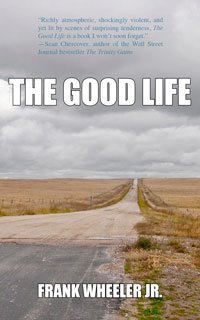
Earl Haack Jr’s father was a county sheriff in rural Nebraska for 30 years. He was feared and respected equally for the way he did his job. The justice might have come from his fists rather than the courthouse on occasion, but people understood he was fair, stuck to his own moral code, and that he truly served the public. What the population might not have fully realised was that his part of Nebraska was an extremely lucrative drug corridor, and that trafficking was inevitable. To his way of thinking, the war on drugs was a dangerous waste of time, and it was better for all concerned if the Sheriff’s Department didn’t try to stop trafficking but to control it.
When Haack Sr is diagnosed with terminal cancer, the town’s elders naturally appoint his son as successor. After all, Earl Jr has a law enforcement background in the big city, and there’s always the chance an outsider just might try to disrupt the way things had always been done around there.
Item number one on the agenda for Earl is that his cousin Eddie and idiot younger brother Mikey want to install their own man at the top of the drug dealing totem pole. To Earl’s mind, it’s better if he and his family oversee the drug trafficking in the area rather than some other scumbag so he begins seeing to it even when it means murder. Number two on his agenda is convincing the state police that his office is cooperating with investigations into drug rings across the state.
Meanwhile Earl’s wife Camila is back in town. The couple are supposed to be getting divorced. Camila fled back to Argentina after Earl caught her having an affair with her photography professor. She then revealed to Earl that she only married him to get a green card. But now she wants reconciliation, though her motives are cast in doubt by the news that her cocaine addiction spiralled out of control while back home. She only made good her debts to her dealer in Argentina by promising him Earl could cut him into the American market. For Earl, the question is whether the return of Camila represents an opportunity too good to pass up, or a threat to the good life he has killed for.
The author has produced a book with a lot to recommend it. The author is from Nebraska and the setting seems very authentic. The scenario of small-town corruption, though familiar, is deftly portrayed. There is a lot of violence which, to the author’s credit, is never trivialised or sugar coated. The ruthlessness and brutality of the drug trade is realistically described.
My chief disappointment was in the way Earl didn’t seem to change as the story progressed. He chooses to avoid making some difficult decisions about the trustworthiness of his family in order to preserve the illusion of the good life that he has built up. I would be good to see more acknowledgement of the strain doing this might create. That aside, The Good Life fizzes and pops with dramatic tension and is a worthy addition to the canon of rural crime fiction coming out of the States at the moment. Recommended for fans of Jedidiah Ayres, Frank Bill and Daniel Woodrell.
New Pulp Press
Print/Kindle
£3.08
CFL Rating: 4 Stars









